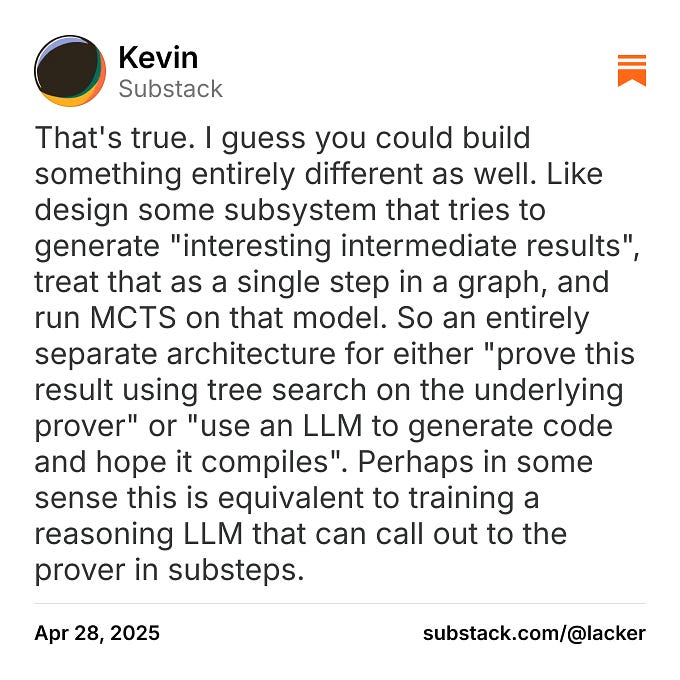substack.com/@lacker/note/c-112843534
Preview meta tags from the substack.com website.
Linked Hostnames
1Thumbnail

Search Engine Appearance
Kevin on Substack
That's true. I guess you could build something entirely different as well. Like design some subsystem that tries to generate "interesting intermediate results", treat that as a single step in a graph, and run MCTS on that model. So an entirely separate architecture for either "prove this result using tree search on the underlying prover" or "use an LLM to generate code and hope it compiles". Perhaps in some sense this is equivalent to training a reasoning LLM that can call out to the prover in substeps.
Bing
Kevin on Substack
That's true. I guess you could build something entirely different as well. Like design some subsystem that tries to generate "interesting intermediate results", treat that as a single step in a graph, and run MCTS on that model. So an entirely separate architecture for either "prove this result using tree search on the underlying prover" or "use an LLM to generate code and hope it compiles". Perhaps in some sense this is equivalent to training a reasoning LLM that can call out to the prover in substeps.
DuckDuckGo
Kevin on Substack
That's true. I guess you could build something entirely different as well. Like design some subsystem that tries to generate "interesting intermediate results", treat that as a single step in a graph, and run MCTS on that model. So an entirely separate architecture for either "prove this result using tree search on the underlying prover" or "use an LLM to generate code and hope it compiles". Perhaps in some sense this is equivalent to training a reasoning LLM that can call out to the prover in substeps.
General Meta Tags
14- titleKevin on Substack: "That's true. I guess you could build something entirely different as well. Like design some subsystem that tries to generate "interesting intermediate results", treat that as a single step in a graph, and run MCTS on that model. So an entirely separate architecture for either "p…"
- title
- title
- title
- title
Open Graph Meta Tags
9- og:urlhttps://substack.com/@lacker/note/c-112843534
- og:typearticle
- og:titleKevin on Substack
- og:descriptionThat's true. I guess you could build something entirely different as well. Like design some subsystem that tries to generate "interesting intermediate results", treat that as a single step in a graph, and run MCTS on that model. So an entirely separate architecture for either "prove this result using tree search on the underlying prover" or "use an LLM to generate code and hope it compiles". Perhaps in some sense this is equivalent to training a reasoning LLM that can call out to the prover in substeps.
- og:imagehttps://substackcdn.com/image/fetch/w_680,h_680,c_limit,f_auto,q_auto:good,fl_progressive:steep/https%3A%2F%2Fsubstack.com%2Fnote%2Fc-112843534%2Fpreview.jpeg%3Fsize%3Dsm
Twitter Meta Tags
8- twitter:label1Likes
- twitter:data11
- twitter:label2Replies
- twitter:data20
- twitter:titleKevin on Substack
Link Tags
38- alternatehttps://substack.com/@lacker/note/c-112843534
- apple-touch-iconhttps://substackcdn.com/icons/substack/apple-touch-icon.png
- canonicalhttps://substack.com/@lacker/note/c-112843534
- iconhttps://substackcdn.com/icons/substack/icon.svg
- manifest/manifest.json
Links
4- https://substack.com/@lacker/note/c-112843534?
- https://substack.com/@lacker?
- https://substack.com/@lacker?utm_source=substack-feed-item
- https://substack.com/home?